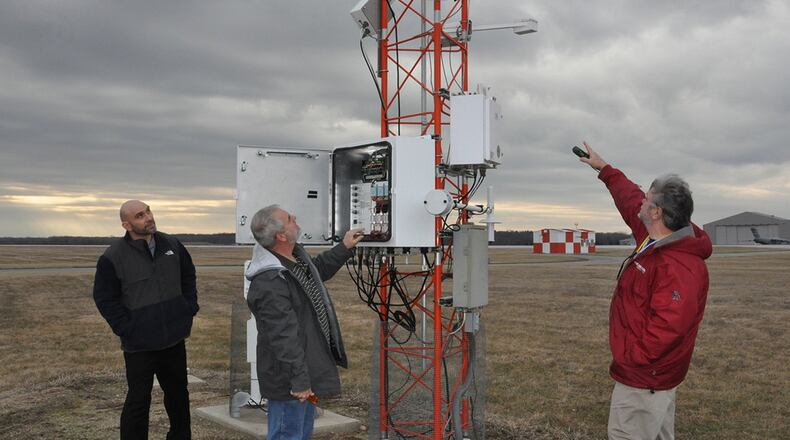In modern times, however, weather predictions are based upon more reliable radar data interpreted by highly trained weather personnel.
“The severe weather season is primarily from March through July,” said Philip Studler Jr., operational meteorologist, 88th Operations Support Squadron. “However, severe weather can occur in any given month.”
Studler explains that forecasters at Wright-Patterson Air Force Base begin looking for severe weather possibilities about three to four days out and that depends on how severe the concern is of impending weather conditions.
“We notify key leaders here at Wright-Patterson about the potential of future weather events that could impact the base,” he said. “As the forecasted severe weather gets closer, weather watches may be issued in advance to warn base personnel.”
According to Studler, a weather watch is issued when the potential for lightning may occur within 10 miles of the base.
“A tornado warning is issued whenever a tornado has been observed or indicated by radar within five miles of Wright-Patterson,” Studler said. “All watches and warnings are relayed to the command post, [and they] are responsible for [passing on] the information through the WPAFB Giant Voice and the AtHOC notification system.”
He said that anyone with access to a base computer has the ability to set up AtHOC to notify them of base severe weather warnings. Also, when that person retires or leaves their base employment, they can stop the base AtHOC notifications prior to leaving the base.
Studler explained how base employees should respond when they hear the Giant Voice issue a three- to four-minute siren.
“Wright-Patterson employees and residents should follow the instructions given by the alert and any additional instructions established through their leadership and radio and television broadcasts,” Studler said. “When the danger is clear, an ‘All Clear’ or cancellation of the alert will be announced through the Giant Voice and AtHOC.”
The Giant Voice is also used for base exercises, but the words, “Exercise. Exercise. Exercise” will be clearly announced at the beginning and the end of the alert.
Safety is of the utmost importance for all Air Force personnel. Please take a moment to visit the Air Force Be Ready site at http://www.beready.af.mil/.
About the Author
